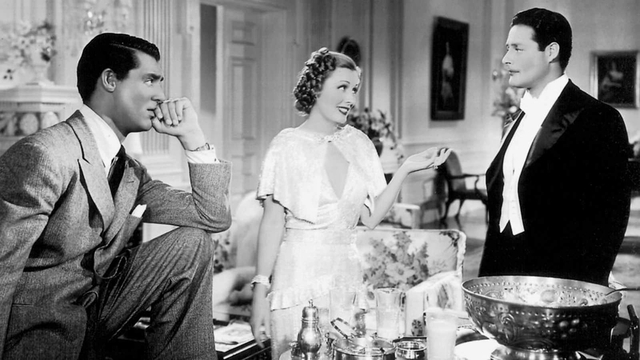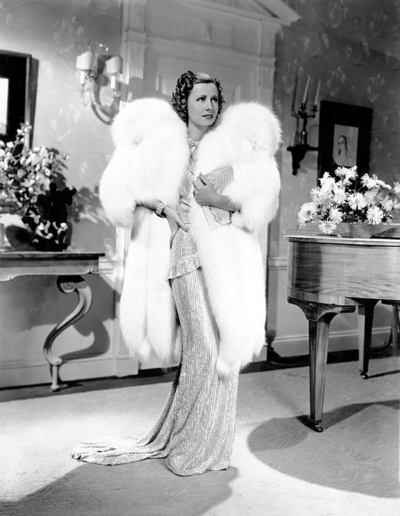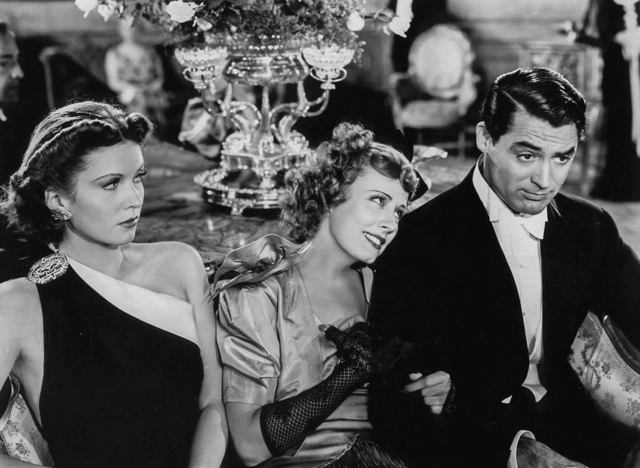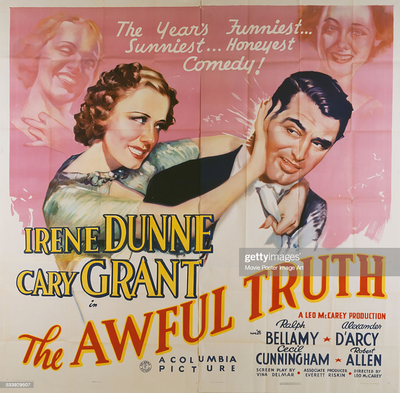We can debate who was the perfect screwball comedy heroine until the end of time – Katharine Hepburn and Carole Lombard are the archetypes, and everyone from Myrna Loy to Jean Arthur to Claudette Colbert have their ardent followers. But it's nearly impossible to deny that Cary Grant has the clearest title to screwball's consummate hero, embodying every quality necessary to share the screen with the genre's defining heroines and reach the final credits with his skin intact, even if his dignity has been shed – sometimes happily – along the way.
It has to be remembered, however, that he arrived late to the genre, after it had been defined by The Front Page, It Happened One Night, My Man Godfrey, Twentieth Century and Libeled Lady, in a film where he co-starred alongside an actress who also came late to screwball, and who didn't esteem her talents as a comedienne at all, working with a director who'd only nip in and out of the genre like the patron who pays for the party house everyone else is enjoying.
Production for Leo McCarey's The Awful Truth (1937) was apparently a bit of a mess. The story began life as a Broadway comedy in 1921 and was filmed twice – once as a silent film in 1925 and again in 1929, in the early days of talkies. Harry Cohn of Columbia bought it from RKO and handed it off to a series of screenwriters that apparently included Dorothy Parker and her husband. In his autobiography, Ralph Bellamy recalls McCarey showing up on set with lines written on pieces of brown paper.
But apparently McCarey liked the appearance of anarchy on set, as a director who encouraged improvisation – it has to be remembered that McCarey was the man who directed (if such a term is at all accurate) the breakthrough Marx Brothers film Duck Soup, and had brought together Stan Laurel and Oliver Hardy when he was an executive at Hal Roach Studios. There was a script for The Awful Truth, co-written with Viña Delmar and her husband Eugene (respectively born Alvina Louise Croter and Albert Zimmerman, who both worked together under Viña's pseudonym.)
The story begins in cosmopolitan New York City, where banker Jerry Warriner (Grant) is sitting under a sun lamp in his athletic club, to give himself the tan he was supposed to have got while on a trip to Florida. We never actually find out what he was actually doing for those two weeks – "What wives don't know won't hurt them," he grandly proclaims – since it turns out upon his return home, with a souvenir basket of fruit, that his wife Lucy (Irene Dunne) has spent the night at a seedy inn with her singing teacher, a Frenchman with the ostentatiously continental name Armand Duvalle (played by Alexander D'Arcy, a much in demand character actor who was, in fact, an Egyptian named Alexander Sarruf.)

Caught in a lie when Lucy finds a California orange in the fruit basket, Jerry goes on the offensive and assumes the worst about Lucy and Armand, who insist that his car breaking down after a party forced them to spend the night together. "The road to Reno is paved with suspicion," Jerry tells his wife, and they swiftly begin their journey down that road with a 90-day separation decree and court-ordered custody of their dog Mr. Smith (Skippy, the same fox terrier who starred as Asta in the Thin Man movies) going to Lucy.
It takes ten minutes to get to this point, and the rest of the film to arrive at their inevitable reconciliation, but on the way we get to see Jerry and Lucy try to move on with hilariously inappropriate new partners. The first is Dan, an Oklahoma oilman played by Bellamy, living in the apartment opposite Lucy with his doting mother.
My favorite line – if forced to choose – in Howard Hawks' 1940 screwball His Girl Friday is Grant's Walter Burns referring to his ex-wife Hildy's new fiancée as looking "like that fellow in the movies, you know... Ralph Bellamy!" That the fiancée was actually played by Bellamy is a richly meta bit of business, a throwback to The Awful Truth (which was a huge hit) and apparently an ad lib by Grant.

Bellamy's roles in these two watermark screwballs created a myth that he was just a straight man, but there are times in McCarey's film where Bellamy nearly steals scenes from Dunne and Grant. His Dan is a broad rich hick cartoon, whose dance floor caper with Dunne – high-stepping his way around a swanky nightclub – is so fantastic that Grant's Jerry has no choice but to pull up a chair and enjoy the spectacle.
McCarey's appreciation for Bellamy's underhanded comic talent is underlined by the fact that the first scene filmed was Dan and Lucy's duet on "Home on the Range," which actually falls in the middle of the picture. Dunne, a trained operatic singer, tries to join in with Bellamy's Dan, who loses the melody when confronted by Lucy's attempt at harmonizing with him. McCarey and Bellamy make Dan a foppish galoot, a mama's boy whose ambition to whisk Lucy back to Oklahoma City is a purgatorial sentence that everyone but Lucy sees.
Irene Dunne had no intention of becoming a comedienne. In her book The Runaway Bride: Hollywood Romantic Comedy of the 1930s, Elizabeth Kendall notes that she was – like Grant – late to the genre, the last major female romantic comedy star of the '30s. Calling her "the Lady among the Runaway Brides," Kendall says that Dunne "wasn't as abrupt and earnest as the others, but she embodies modes of compromise and independence that were different from theirs – older modes, in fact, of becoming romantically involved."

Her operatic ambitions turned to musical theatre, which led her to Broadway and from there to Hollywood with the advent of sound, tempted into the movies along with other stage actors with good voices. Her first Oscar nomination came with Cimarron (1931), her second role, and she spent most of the following decade mostly in dramas, some romantic, some melodramatic. She went on vacation in Europe to avoid being cast in her first screwball, Theodora Goes Wild (1936), but thankfully the part was waiting for her when she got back.
Dunne got along well with McCarey – they were both from the same Catholic, conservative and Republican social milieu in Hollywood – and that probably made her pivotal role in the genre so much easier to endure. There's no denying she has a lot of fun with Lucy Warriner, a woman very much the equal of her husband and any other man she encounters, though she's not above putting on a pragmatically ditzy air when addressing judges and cops.
In his book Romantic Comedies in Hollywood: From Lubitsch to Sturges, James Harvey notes that Dunne has slipped from the front rank of Hollywood's golden age stars, and is rarely counted among its famous comediennes. (A fate to which she might have happily resigned.) But she has rare qualities not shared by her more renowned contemporaries.

"If Dunne weren't so irreducibly American," Harvey writes, "she would have been an ideal Elizabeth Bennett in Pride and Prejudice. She is Elizabeth in essential ways: in her combination of charm and shrewdness, of recklessness and seriousness. And like Jane Austen, Dunne is a comic artist who seems to put some final value on experiences of wit and playfulness. She generates antipathy too, it seems, for some of the same reasons Austen sometimes does: the ladylikeness, the commitment to propriety."
It doesn't take much in the end for Jerry to throw a monkey wrench into Lucy's romance with Dan – an offensive that climaxes when he barges into her recital in Armand's apartment, a tour de force slapstick scene by Grant, whose unbelievable physical skill as a comedian still hadn't been really explored on screen yet. She's initially appalled but realizes mid-song how much he makes her laugh, in a relationship apparently based more on amusement than erotic spark. But with the ninety days ticking away, it's Lucy's turn to wreck Jerry's attempt at moving on.
He has, it seems, fallen in with Barbara Vance, an heiress modeled loosely on the two Hutton stepcousins – Barbara and Eleanor Post Hutton. (Grant himself would later be briefly married to Barbara Hutton; director Preston Sturges had much earlier been married to Eleanor. Hollywood has always loved an heiress.) It's hard not to notice that the actress playing Barbara (Molly Lamont) bears a conspicuous resemblance to Dunne.

She shows up at the Vance's manorial country home impersonating Jerry's sister, Lola, a bubbly chanteuse in a fringed frock who constantly drops hints at more humble origins than the Ivy League one Jerry tries to play up to bond with the Vances. The scene ends with "Lola" doing her old act for the bluebloods in black tie – a broad version of the bawdy, cheesy song Jerry's date, Dixiebelle Lee, had performed earlier at the nightclub where Dan had unwisely taken Lucy.
It was, we know, a mission of mercy – the old mischievous Jerry, the one who sings a raucous duet on Lucy's piano with Mr. Smith during his court-ordered "visitation" with the dog, was being smothered by the new, proper Jerry. All that remains is for the pair to become a couple again, which happens with minutes to spare on the ninety day deadline, at Lucy's aunt's rustic cabin, where she delivers this line with hooded eyes and a sultry voice:
"Things are just the same as they always were only you're just the same as you always were so I guess things will never be the same again."
You have to remember that Grant's immense skill as a comedian was still mostly unknown when he made The Awful Truth. His early career was notable for inauspicious turns as Mae West's arm candy, his comic talent only glimpsed in films like Sylvia Scarlett. But the year had begun with Grant holding his own onscreen with Constance Bennett (the great unsung screwball heroine) in Topper, and the Oscar won by McCarey for the film – not to mention the nominations received by Dunne, Bellamy and the Delmars – made Grant Hollywood's newly minted and never-duplicated comic heartthrob.
The following year would team Grant up with Katharine Hepburn in Bringing Up Baby and Holiday, making every comic role that followed (His Girl Friday, My Favorite Wife, The Philadelphia Story, The Talk of the Town, Arsenic and Old Lace, The Bachelor and the Bobby-Soxer, Mr. Blandings Builds His Dream House, I Was A Male War Bride, People Will Talk, Monkey Business, etc.) seem like they were custom made for Grant. (And many of them were.)

And like Dunne, Grant was unwilling – he actually offered to buy his way out of the film at one point, at another suggested that he'd be better in Bellamy's part. (Hard to imagine, then or now.) But McCarey – who acknowledged that he shared a kind of low quality resemblance to Grant – held firm, and Grant turned in a career-defining performance.
In an appreciation of Grant in Runaway Bride, Elizabeth Kendall writes about the duet scene with Mr. Smith:
"Our idea of good manners is swept away by this image of Cary Grant, beaming with irrepressible, scornful charm in the midst of a vaudeville stunt with his dog. We feel the tremendous power of the man; it swallows up everything else in the scene, drowning out the conversation between Dunne and Bellamy, until the foppish Bellamy is forced to leave."
In the end, it's hard to imagine any of it without Cary Grant – The Awful Truth, screwball comedy, Hollywood in general. He was the man we didn't know we were looking for – seductive and threatening, impossibly good-looking but never vain, a man destined to overcome challenges that he, like most men without his talent or looks, would have been happy to avoid. As the old joke goes – attributed to Grant and practically his epitaph – every man wanted to be Cary Grant, even Cary Grant. And none of us were.
Mark Steyn Club members can let Rick know what they think by logging in and sharing in the comments below, as access to the comments section is one of many benefits that comes along with membership in the Mark Steyn Club.






















